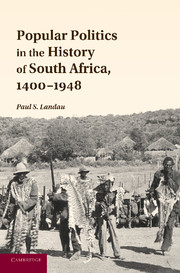Book contents
- Frontmatter
- Contents
- List of Figures
- Preface: The Birth of the Political
- Acknowledgments
- 1 Eyewitness Engagements (Highveld political discourse at the start of the 1800s)
- 2 History before Tribes (Partnership, alliance, and power)
- 3 Translations (Missionaries and the invention of Christianity)
- 4 The Incipient Order (Moroka's reign, 1828–1880)
- 5 Mixed People (The Samuelites, the Griqua, and other subjectivities, 1880–1928)
- 6 Twentieth-Century Tribes
- Primary and Archival Sources
- Bibliography
- Index
- References
4 - The Incipient Order (Moroka's reign, 1828–1880)
Published online by Cambridge University Press: 04 August 2010
- Frontmatter
- Contents
- List of Figures
- Preface: The Birth of the Political
- Acknowledgments
- 1 Eyewitness Engagements (Highveld political discourse at the start of the 1800s)
- 2 History before Tribes (Partnership, alliance, and power)
- 3 Translations (Missionaries and the invention of Christianity)
- 4 The Incipient Order (Moroka's reign, 1828–1880)
- 5 Mixed People (The Samuelites, the Griqua, and other subjectivities, 1880–1928)
- 6 Twentieth-Century Tribes
- Primary and Archival Sources
- Bibliography
- Index
- References
Summary
In the nineteenth century, colonialism brought missionaries and literacy and religion and ethnic division to the highveld. It also brought about a dramatic transformation in people's access to the land. This change modulated the way ordinary people were able to orient themselves toward collective ends, conceived in the terms explored in earlier chapters. Chiefship, ranked alliances (including “twin courts”), prestige-place associations (ha rotse, rolong, crocodile), and the idea of sharing a paternal ancestor – these ideas continued to structure people's mobilizations. Shifting, diminishing access to land helped determine how, and in what form, their communities survived.
The approach taken in this chapter is to consider a large part of the century, 1828–1880, while focusing increasingly on the southern highveld and on popular mobilizations that sprang from it, in the era of conquests, enclosures, and privatizations. The period also indicates precisely the reign of Chief Moroka, Sefunelo's son and heir, and the last of the independent chiefs of the southern highveld. The greatest of the material changes in people's lives came toward the end of this half-century.
As a preliminary, we may note the continuing heterogeneity of highveld life in the 1830s. As men and women struggled to protect their access to land under attack, they also absorbed and accommodated distant kin, orphans of famines or commando razzias. Moroka welcomed his old ally, the people-of-Tshidi court, to his vicinity, one of many chiefdoms fleeing the “zulu” Matebele. Together they formed a twin court, while other towns and centers hosted other hybridities.
- Type
- Chapter
- Information
- Popular Politics in the History of South Africa, 1400–1948 , pp. 108 - 161Publisher: Cambridge University PressPrint publication year: 2010



